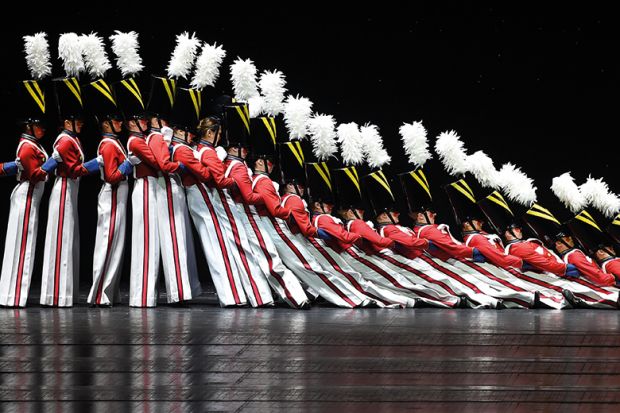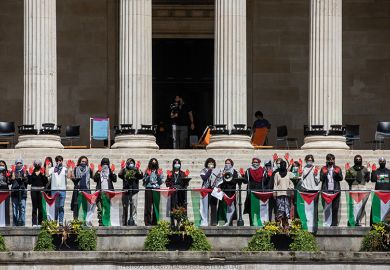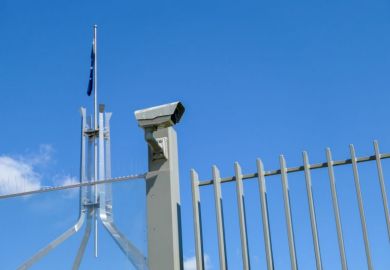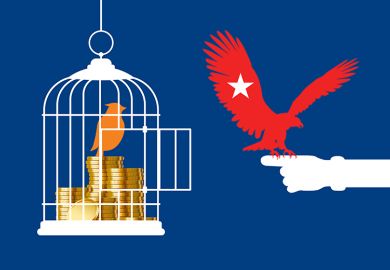The trend of elite US colleges, such as Harvard University, declaring that they will no longer take stances on hot-button issues has created a “domino effect” across the sector, according to experts.
Universities around the world faced calls to make statements on the 7 October Hamas attacks, and on Israel’s subsequent invasion of Gaza, with concerns that “statement culture” was a significant reason why protests on campuses were so divisive.
Harvard announced that it would no longer be commenting on issues unrelated to the “core function” of its institution in May, and as another year of campus clashes begins it has been joined by the University of Pennsylvania, Cornell University and others in recent weeks.
John Tomasi, president of the Heterodox Academy (HxA), which advocates for political diversity in higher education, said colleges taking stances on issues could send “a chilling signal” about the important pluralist nature of a university.
“When university presidents leap in to take a position for the university on a political controversy or an ethical controversy, it undercuts that pluralism,” he told Times Higher Education.
While the philosophy of the neutral institution can be traced back to the 1967 Kalven Report at the University of Chicago, presidents have for centuries been making statements on controversial issues – Henry Dunster, the first president of Harvard, was ousted from the role over his stance against the baptising of infants.
However, with the Gaza crisis, Professor Tomasi said, for the first time, presidents were “finding no safe thing to say” – with Harvard’s 30th president, Claudine Gay, forced to resign in the wake of criticism over her comments about antisemitism on campus.
Others faced similar problems on the “hot potato” issue, as Cornell president Martha Pollack was criticised for making three different statements in just three days.
“This issue, like none before, put presidents in an extremely awkward position on this practice that they’ve grown comfortable engaging in,” added Professor Tomasi. “This has been a different kind of beast, and that forced the reckoning.”
But with institutions such as Emerson College citing Harvard’s new position, Professor Tomasi said it “gives cover to a lot of other university presidents to do it as well”. Others such as Tulane University, Johns Hopkins University and the University of Southern California have also announced varying positions of neutrality.
“You get a kind of domino effect or cascade effect,” said Steven McGuire, the Paul and Karen Levy fellow in campus freedom at the American Council of Trustees and Alumni.
“That’s why it’s important to keep an eye on and pressure elite institutions to reform themselves because they do have the capacity to impact the higher ed sector as a whole.”
But if it is going to help cool campus tensions this year, Dr McGuire said, neutrality must be part of a broader strategy, including clear rules on protests and what the limits of freedom of expression are in terms of time, place and manner.
Some are sceptical of the sudden shift. Anthony Leaker, a principal lecturer in cultural and critical theory at the University of Brighton, said it was “disingenuous for a university to claim to be neutral”.
“Neutrality is not possible. Neutrality is a liberal ideal or fantasy that disavows the manifold ways in which institutions such as universities are performing political and ideological actions all the time,” he said.
Dr Leaker said university leaders could attempt to refrain from taking a position on a given political event, but that would not equal neutrality because certain events demand a position and not stating one is “tantamount to implicit support, or complicity”.
In addition, he warned, institutional neutrality could be seen as the latest response to “the wider culture war onslaught against universities” and how they have been targeted by thinktanks, governments and the press for being too “woke, too left wing, too indulgent to students”.
Professor Tomasi said the HxA model of statement neutrality was not a “vow of silence”, and presidents had a responsibility to speak out when the university’s core issues were affected.
Leaders can make expressions of concern and compassion for members of the affected community but are not meant to take positions on moral controversies themselves and must take a long-term view, which may “seem strange to outsiders”, said Professor Tomasi.
While he welcomed the “huge opportunity” brought by changes in policy, Professor Tomasi would like these institutions to go further and have neutrality more embedded by trustees affirming it as a policy for the university going forward.
And given the demands for many colleges to divest from investments and other relationships with Israel, he said that the “$100,000 question” this year will be whether these colleges decide that a commitment to institutional neutrality equates to investment neutrality.
POSTSCRIPT:
Print headline: Colleges fall into line on neutrality
Register to continue
Why register?
- Registration is free and only takes a moment
- Once registered, you can read 3 articles a month
- Sign up for our newsletter
Subscribe
Or subscribe for unlimited access to:
- Unlimited access to news, views, insights & reviews
- Digital editions
- Digital access to THE’s university and college rankings analysis
Already registered or a current subscriber?








